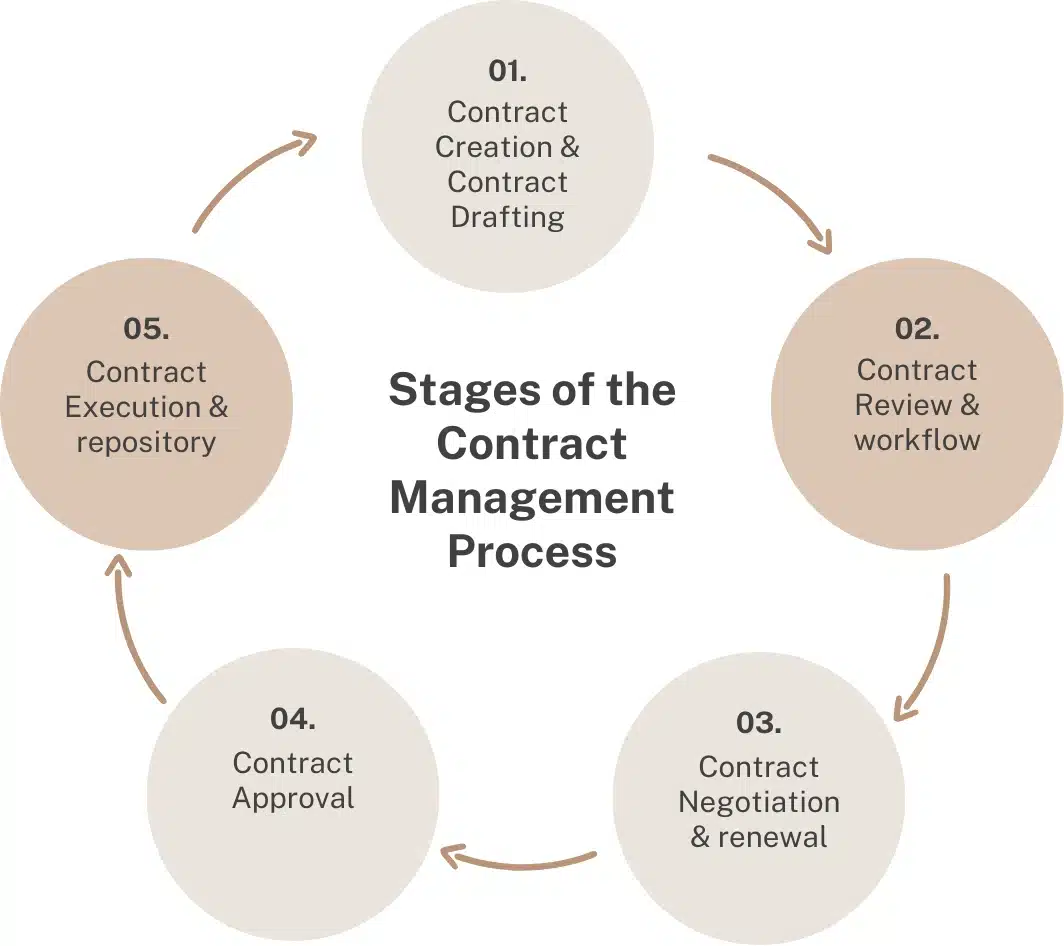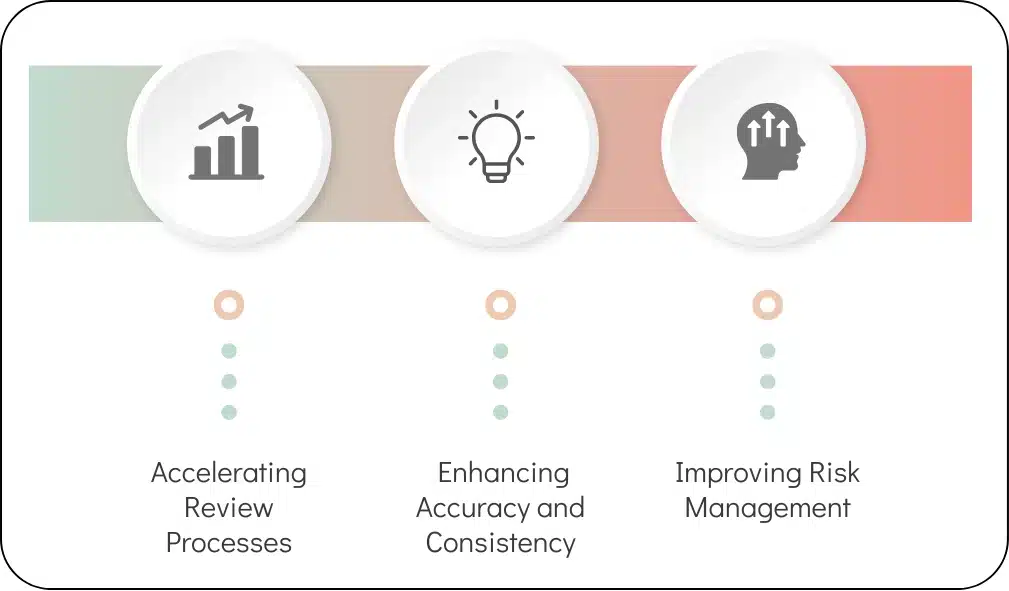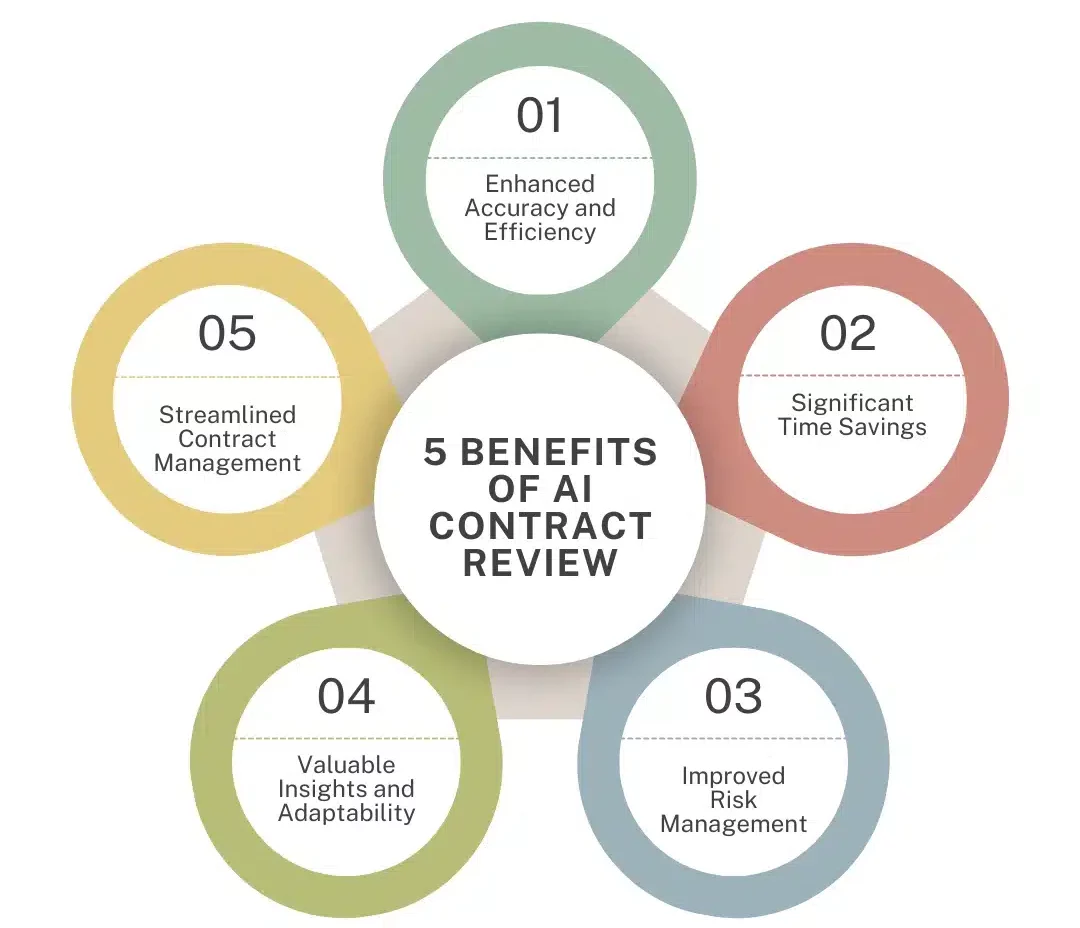With growing demands on legal teams, the legal landscape is rapidly adopting artificial intelligence (AI), transforming how legal departments manage and review contracts. By speeding up the review process and improving accuracy, artificial intelligence (AI) offers a more efficient alternative to traditional manual methods. This innovation not only enhances risk management but also supports legal professionals in analyzing a wide range of contracts. Let’s dive into how AI is revolutionizing legal processes and what it means for your organization.
What is AI contract review?
AI contract review software is a new tool that uses artificial intelligence. It makes contract review easier and faster. It helps with tasks like pulling out information and looking at documents. This way, it improves accuracy and efficiency in contract management.
What does contract review include?
Text Analysis: AI systems can read and understand the text within contracts, identifying key clauses, terms, and obligations. This helps in recognizing important sections like payment terms, confidentiality clauses, and dispute resolution mechanisms.
Clause Identification and Comparison: AI tools can compare contract clauses against standard benchmarks or previous contracts to identify deviations, risks, or non-compliance. They can also flag unusual or non-standard terms.
Risk Assessment: AI can assess the potential risks associated with specific clauses or the overall contract. It can highlight areas that may need legal review or negotiation, such as ambiguous terms or unfavorable conditions.
Automated Drafting and Recommendations: Some AI systems can generate recommendations for contract modifications or even help draft new contracts based on identified needs and standard practices.
Efficiency and Accuracy: By automating repetitive and time-consuming tasks, AI contract review can significantly speed up the contract review process and reduce the likelihood of human error.
Understanding AI Technology in Contract Review Processes

1. How AI Analyzes Legal Language
- Natural Language Processing (NLP): AI uses natural language processing to read and understand complex legal language. It breaks contracts down into simple parts. It also finds important terms, clauses, and potential issues.
- Pattern Recognition: AI algorithms can spot patterns and unusual signs in contract language. This helps to find inconsistencies or deviations from standard clauses.
- Contextual Understanding: Better AI models can understand the context of terms. This helps read legal text with more accuracy. It ensures the nuances of the law are properly accounted for.
2. Automating Routine Tasks
- Clause Extraction: AI can help find key parts in contracts. These parts may be payment terms, confidentiality agreements, and termination conditions. This makes it easier and saves time compared to doing it by hand.
- Comparison and Analysis: AI tools let people compare different versions of contracts. They can easily find changes or errors. This improves the review process.
- Standardization: AI makes contract review processes uniform. By handling regular tasks, it keeps things consistent and lessens differences that can occur when people do the work.
3. Enhancing Risk Management
- Finding Risks: AI tools examine contracts to spot possible risks. These risks might involve terms and rules, like unusual termination clauses or regulatory issues.
- Alerts for Problems: AI sends early warnings about risky clauses or compliance concerns. This helps organizations address problems before they grow into major issues.
- Possible Outcomes: AI can suggest various scenarios based on contract terms. This helps in predicting outcomes and risks, which is helpful for managing risks ahead of time.
4. Providing Actionable Insights
- Data Analysis: AI examines data from earlier contracts. It identifies common issues and trends. This improves future contract drafting and negotiations.
- Performance Metrics: AI tracks key performance indicators in contract management. This includes the time taken to review contracts and compliance rates. It provides helpful information to enhance these processes.
- Customized Recommendations: Based on past data and user feedback, AI offers tailored suggestions. These help to improve contract terms and management practices.
5. Adapting and Learning Over Time
- Machine Learning: AI systems improve over time with machine learning. They learn from past reviews and user actions to enhance their algorithms.
- User Feedback Integration: AI tools adapt based on user feedback. They use suggestions to better their functions and meet specific needs.
- Scalability: AI systems get better as they handle more data and situations. They effectively manage complex contract review tasks and grow with the organization’s needs.
You might want to read: Effectively use AI in Contract Drafting
3 Ways Contract Review AI Can Transform Your Legal Department

1. Accelerating Review Processes
- Faster Turnaround: AI tools can quickly read and check contracts. This reduces the time legal teams need to complete reviews.
- Automated Tasks: Machines handle routine tasks, like finding key clauses and comparing contracts. This speeds up the whole review process.
- Efficiency Boost: AI manages time-consuming tasks. This allows legal workers to focus on more complex and important work, boosting the team’s productivity.
2. Enhancing Accuracy and Consistency
- Accurate Analysis: AI systems read legal text effectively. This helps to lower human mistakes and ensures clear understanding of contract terms.
- Consistent Standards: AI applies the same rules to all contracts. This creates steady reviews and makes them more reliable.
- Fewer Errors: AI can spot mistakes and issues in contracts. This reduces the risk of missing details or making errors during contract review.
3. Improving Risk Management
- Early Detection: AI can find risks and compliance issues early in the review process. It looks for problems like bad clauses or worries about rules.
- Proactive Solutions: By showing issues before they get bigger, AI helps legal teams handle risks. This reduces the chance of fights and legal problems.
- Scenario Analysis: AI can set up different scenarios based on contract terms. This helps predict and lower possible risks.
5 Benefits of AI Contract Review

1. Enhanced Accuracy and Efficiency
- Careful Analysis: AI tools look closely at complicated legal language. They find errors and unclear terms very accurately.
- Fewer Human Mistakes: Using AI in the review process helps cut down on mistakes. This happens because people might miss things or feel tired.
- Quick Processing: AI speeds up contract review. This helps find important issues more quickly.
- Handle More Contracts: With better efficiency, legal teams can manage more contracts in less time.
2. Significant Time Savings
- Task Automation: Simple tasks, like finding key words and comparing sections, are done automatically. This reduces manual effort.
- Focus on Strategic Work: Lawyers can focus more on important tasks that add value.
- Reduced Workload: AI handles repetitive tasks, lowering the workload for legal teams.
- Quicker Turnaround: AI tools make contract review faster. This results in quicker decisions and actions.
3. Improved Risk Management
- Early Detection: AI finds potential risks and compliance issues early in the contract lifecycle, such as problems in clauses.
- Proactive Mitigation: Discovering issues early helps organizations address them before they escalate.
- Compliance Assurance: This makes sure that contracts follow key rules, reducing legal and financial risks.
- Enhanced Risk Assessment: AI tools provide insights that help us better evaluate and manage risks.
4. Valuable Insights and Adaptability
- Data-Driven Insights: AI checks past contract data to provide useful insights and find trends.
- Continuous Improvement: It updates based on user feedback, changing its algorithms and suggestions as time goes on.
- Enhanced Decision-Making: It offers important information that aids smart decisions about contract management.
- Customizable Learning: It learns from interactions to better meet the changing needs of the organization.
5. Streamlined Contract Management
- Centralized Platform: It offers one spot to manage contracts, renewals, and changes. This makes handling administration easier.
- Improved Tracking: It watches important milestones and deadlines closely. This helps make sure actions are taken on time and agreements are kept.
- Simplified Governance: It enhances oversight and control over contract processes, making management better.
- Better Stakeholder Communication: It enables clear and effective talks with stakeholders, making contract management easier.
You might want to read: 5 Key Benefits of Generative AI in Contract Management
Do’s and Don’ts of AI contract review
|
Do’s |
Don’ts |
|
Do use AI to automate routine tasks. |
Don’t rely solely on AI for legal judgment. |
|
Do ensure AI tools are trained on relevant legal data. |
Don’t ignore the importance of human oversight. |
|
Do regularly update and maintain AI systems. |
Don’t use outdated or poorly maintained AI tools. |
|
Do integrate AI with existing contract management systems. |
Don’t use AI tools that lack integration capabilities. |
|
Do use AI to identify common clauses and anomalies. |
Don’t assume AI will understand complex or unconventional clauses. |
|
Do ensure compliance with data protection regulations. |
Don’t compromise on data security. |
A Beginner’s Playbook for AI in Contract Review
Starting to use AI for contract review can feel overwhelming at first. However, if you break it down into smaller steps, it becomes simpler. Start by learning the basics. Look into the various AI features available. See how they assist legal teams, sales teams, and procurement teams in solving their issues.
Get to know the best ways to use AI. First, pay attention to data security steps. It is also important to have human oversight to keep things accurate. Work to create a strong system that improves your contract lifecycle and reduces risk.
Step 1: Selecting the Right AI Solution for Your Business
When looking at the many AI contract review solutions available, it’s important to pick one that fits your needs. Start by identifying the issues you have with your contracting process. Are review times taking too long? Are the reviews too inconsistent? Or do you struggle to get valuable insights from your contracts?
When you pick a solution, think about how simple it is to use. Check the customization options and how it can grow with you. Make sure it works well with your current systems and workflows to achieve the best results. Look for platforms that use generative AI to enhance contract drafting and review.
Step 2: Training Your Team on AI Tools and Processes
To use AI well for contract review in your work, you need to train your team on AI tools and how to use them. Teaching your team the right skills helps them work with AI better and improve the contract review process. Training should include understanding insights from AI, using contract review tools correctly, and keeping data safe. This step is important for making your operations better and getting the most from AI in contract management.
Step 3: Implementing AI into Your Contract Review Workflow
- Start using a step-by-step method for implementation.
- Don’t make all the changes at once.
- Slowly add AI tools into your contract review workflow.
- This helps your team adjust to the new technology and processes little by little.
Check your workflow to find tasks that can be automated. Tasks you do regularly, like finding clauses, extracting data, and doing simple risk assessments, can be done by AI. This will allow your legal team to concentrate on more complicated reviews and negotiations.
Step 4: Monitoring and Adjusting for Continuous Improvement
Treat using AI tools as a project that can always improve. Keep an eye on how well your AI tools perform. Talk to your legal team regularly for their opinions. Their feedback is key to spotting what needs to improve. This could mean updating the AI algorithms, changing settings, or tweaking the workflow.
AI tools can give you helpful insights into your contracting process. You can use the data and analysis from these tools to spot patterns or delays. They can help you make contracts more standard and boost your contracting methods.
This method uses data to make your contract review process better. It helps you get the most out of your AI investment as well.
Overcoming Challenges in AI Contract Review
Using AI for contract review has many benefits. But there are some challenges as well. A major concern is data security. AI tools handle important information, so it is essential to pick a solution that emphasizes privacy and has strong security features.
Another issue is that legal language can be tough to read. Natural language processing (NLP) is improving, but some tricky legal points may still need a person to understand them. It’s essential to have human oversight to make sure everything is right and to handle any unique situations in contracts.
Navigating Data Privacy and Security Concerns
When you use AI for contract review, it is important to think about data security. You should look at the security features of any AI tool you choose. Check for things like data encryption. This helps keep sensitive information safe when it is stored and when it is sent.
It is important to set strong access controls. Not every worker needs to see all the contract data. You should define roles and permissions. This will limit access based on job needs. Only authorized people can see confidential information.
It’s very important to keep up with the data privacy laws that affect your work. You need to follow rules like GDPR. Pick AI solutions that can help you with these requirements.
Addressing the Limitations of AI in Complex Contracts
AI is good at looking at regular contracts. But it has some limits with complex agreements. It may not fully get parts that need personal judgment or special industry knowledge.
Human oversight is very important for contracts that are complex or have unusual terms. Legal experts should review everything that AI creates. This is especially true in areas where there might be issues or that need more attention.
The main point is to use AI as a useful tool. AI should not fully replace legal knowledge.
The Future of AI in Contract Review
The future of AI in contract review is likely to bring significant advancements and transformative changes. Here are some key trends and developments to anticipate:
- Increased Accuracy and Precision: As AI algorithms continue to improve, we can expect even greater accuracy in identifying and analyzing contract clauses, risks, and compliance issues. Enhanced natural language processing (NLP) and machine learning techniques will contribute to more precise and reliable contract review.
- Greater Integration and Automation: AI will increasingly integrate with other legal technology solutions, such as contract management systems, document management platforms, and e-signature tools. This will create more seamless workflows, allowing for end-to-end automation of contract-related tasks.
- Enhanced Predictive Analytics: AI will leverage predictive analytics to provide insights into potential outcomes and risks based on historical data and contract trends. This will enable legal teams to make more informed decisions and proactively address potential issues.
- Integration of Blockchain and Smart Contracts: AI may increasingly integrate with blockchain technology and smart contracts to provide greater transparency, security, and automation in contract management. This combination will facilitate more efficient and tamper-proof contract execution and monitoring.
- Continuous Learning and Adaptation: AI systems will continuously learn and adapt from new data, user interactions, and changing legal standards. This ongoing evolution will ensure that AI tools remain relevant and effective in addressing emerging challenges and opportunities in contract review.
Conclusion
In conclusion, AI has really changed contract lifecycle management. It makes the process quicker and more accurate. Businesses can use AI tools to handle contracts better. This leads to fewer mistakes and improves compliance with rules. To use AI well, it’s important to choose the right tool. You also need to train your teams and check their progress based on user feedback. There are many examples from different industries that show the great benefits of AI. It takes care of complex legal language and intellectual property much more effectively.
Using AI tools like ChatGPT and large language models can help reduce the workload. They can make contract management simpler. Even though problems like data privacy and checking contracts by hand still exist, using AI is a smart idea. It helps improve business practices. This can lead to long-term success in managing the contract lifecycle, including signing and ending contracts and other important tasks.
FAQs
How does AI improve contract review accuracy?
One big benefit of AI is that it makes contract review more precise. AI tools look closely at contracts. They lower the chances of human mistakes that might happen during manual reviews. By using automation in the review process, we can catch missed details. This helps to make sure every part of the contract gets careful attention.
Can small businesses benefit from AI contract review tools?
Many new contract review tools are useful, especially for small businesses. They can easily adjust to how many contracts you have. These tools offer quick and accurate reviews. Plus, they don’t cost much money. That’s why they are a great option for your business operations.
AI contract review is this safe because we are using AI here
AI contract review is safe because of strong security measures and encryption. Good AI software companies keep your data protected and follow the rules. This means it’s a secure option for contract review.





